
You may have heard someone say that now is the best time to start a drone business. Or maybe you just have a hunch.
The growing popularity of these flying machines do lend some credence to the idea. The drone market has exploded — and continues to expand. It is estimated to reach $14 billion over the next decade, according to one study.
Drones and their various applications have opened the door to so many opportunities across several industries.
Are there ways in which you can you cash in on that trend?
Flying your drone is all well and good, and you should go for it by all means. But wouldn’t it be wonderful if you if you can make some serious green in the process?
Fortunately, there are lots of drone money-making ideas you can flesh out into fully-fledged drone business, and we list more than just a few below. In fact, we listed just about every idea we could think of and find scattered around the internet.
With the falling prices of drones — a situation driven by competition between dozens of manufacturers, as well as advancements in technology — there can hardly be a more favorable time for anyone to start a drone-related business.
For an affordable price, you can now get your hands on UAVs that come with a host of features you can monetize. For example:
Drones now come with Ultra High Definition cameras that can capture high resolution images and video.
They are also equipped with GPS capabilities and autopilot that enable the drone to trace defined routes.
Other features include:
- In-built Bluetooth capabilities
- Collision and obstacle avoidance software
- Terrain adherence (a capability that enables drones to keep to a set height above the ground while soaring over undulating landscapes)
- Follow Me features (autonomously follow a defined target)
- The ability to reach speeds that exceed 50 mph (80 kilometers per hour) or higher
Crucial features that have to do with safety for pilots and others, efficiency, distance maintenance, and battery lifespan also keep getting better with each passing generation of devices.
Add this hardware and software advantages to the fact that businesses are integrating drones into their processes, and what you have is something akin to a perfect alignment of stars for starting a business venture.
First things first, however, there are few regulations and best practices you have to keep in mind before you begin. Flying a drone for business is not viewed the same as flying for fun, and thus it comes with its own set of rules.
- 𝗟𝗶𝗴𝗵𝘁𝘄𝗲𝗶𝗴𝗵𝘁 𝗮𝗻𝗱 𝗣𝗼𝗿𝘁𝗮𝗯𝗹𝗲...
- 𝗡𝗼 𝗥𝗲𝗴𝗶𝘀𝘁𝗿𝗮𝘁𝗶𝗼𝗻 𝗡𝗲𝗲𝗱𝗲𝗱 - Under...
- 𝗘𝘅𝘁𝗲𝗻𝗱𝗲𝗱 𝗙𝗹𝗶𝗴𝗵𝘁 𝗧𝗶𝗺𝗲 - Enjoy longer...
- 𝗝𝘂𝘀𝘁 𝗮 𝗙𝗲𝘄 𝗧𝗮𝗽𝘀 𝗳𝗼𝗿 𝗘𝗽𝗶𝗰...
- 𝗔𝗱𝘃𝗮𝗻𝗰𝗲𝗱 𝗧𝗿𝗮𝗻𝘀𝗺𝗶𝘀𝘀𝗶𝗼𝗻...
- Lightweight and Compact - Mini 3 weighs under 249 g. Perfect for taking with you on your...
- DJI Mini 3's flight time can be extended up to 51 mins with the Intelligent Flight Battery...
- For the latest aircraft firmware, the Remote ID will only be activated when the...
- Stunning Imagery - Film in 4K HDR Video for crystal clear aerial shots. Capture details in...
- Striking Vertical Videos are Ready to Share - With True Vertical Shooting, you can easily...
Rules and Regulations in Place for Starting a Drone Business
Starting a commercial drone business requires more than acquiring a catchy name, designing a shiny logo and building a network of customers.
Those are the fun parts, but with them come the nitty-gritties like obtaining a business license, getting special training if necessary, obtaining insurance, and keeping abreast of the rules and regulations in place.
The foundation of every business consists of getting legit from the get go. And depending on where you are, this process can be varied.
For example, if you are in the UK, Australia, Canada or the EU, things can get a little fuzzy. But in the US there are very straightforward guidelines.
In the US there are essentially three requirements for remaining on the good side of the law. These are:
- Getting Part 107 certification for you and all pilots you employ
- Decide on your business structure
- File for a business license
We won’t go into the details of how to go about registering your drone business and getting certified as a safe operator in this article.
But that does not give you a free pass from following through with the procedure. And if you think what you are in any doubt about what classifies as commercial use of a drone you can take a hint from this quote from commercial helicopter pilot and UAV specialist, Ian Smith:
“By accepting that beer, or bus ticket, or few bucks of gas — you’ve been given compensation for operating your drone. If you accept compensation, then you’re operating commercially.”
Basically, compensation is compensation. If you accept anything — no matter how small — in exchange for your drone or drone services then you are a commercial operator and you need to get registered to stay legal.
Why Starting a Drone Business Is a Good Idea
After drones became available to the public, it was only a matter of time before entrepreneurs woke up to the fact that they presented massive business opportunities.
Opening a drone business is a great way to allow yourself grow simultaneously with the industry as venture capital, technology, and increasing demand drive it forth.
Here are some stats to open your eyes to the massive economic impact which drones offer:
- Studies predict the drone market could reach a size of $48.88 billion by 2023
- The economic impact of integrating drones will exceed $82.1 billion between 2015 and 2025
- An estimated 103,776 jobs will be created by 2025 as a result of the integration of drones
- The integration of drones will cause tax revenue to US states will exceed more than $482 million by 2025
- For every year that drone integration is delayed, the US loses more than $10 billion in potential economic impact
Simply put, there numbers show there has never been a better time to look into starting a drone business. It is a business that is experiencing industry growth, relatively low startup costs, high demand, several vertical opportunities, and a reasonably easy certification process.
Let’s get into the actual ideas now. We’ve started with ways that you can make money by using a drone, followed by other drone businesses that you could start.
Ways to Make Money with a Drone
There are a few ways you can use your drone to make money — sometimes on a consistent basis — if you want to.
Many drone operators find that the skills they use as they fly their drones daily become valuable from a monetary standpoint when they are applied elsewhere.
The money making ideas shared here can be applied by anyone at any time and don’t need you to necessarily go through the hassle of building a business.
Drone Photographer

Drone photography is another drone business idea you can easily get into and make a nice income for yourself.
There is never a shortage of events people want to immortalize in photo and video format, and you can capitalize on that need by offering to create something truly special with your drone.
This is a very competitive space, though; so your skills need to be top notch to establish a name for yourself. Luckily, you can always offer a beginner’s discount as you build your skill and reputation.
There are at least four obvious niches that you could carve your way into — and specialize in — as a drone photographer. These niches are:
- Weddings
- Real estate
- Music concerts and festivals
- Sports events
By specializing in one area, you become more well-known for doing that specific service and can charge a premium for being one of the experts in the space, rather than a generalist photographer.
Videographer & Filmmaking

Drone videographers and filmmakers can also make money by taking on projects that require aerial footage for short films, promotional videos, and movies.
These sort of footage usually got created with the use of helicopters. Cost was often a deterrent, even for the big Hollywood studios. Helicopters are also notorious for being inflexible when used in shooting footage.
Drones have opened up a whole new chapter in film making with their affordability and flexibility during use.
As a drone videographer and filmmaker, you can cash in on that by offering your skills and you device in exchange for a fee and perhaps even a mention during the end credits.
As a videographer, you can record drone footage of all of the same types of things that we mentioned as a photographer; weddings, music events, sports events, real estate, etc.
But you can also branch out into other areas too. You could help record short films or even feature-length movies, or look into the media space and record videos for advertisement and promotion.
Stock Photography & Videography
Another way you can make money as a drone photographer or videographer is by selling the aerial pictures and videos you capture.
If you have a drone with a high quality camera, you can make a nice living this way.
For example, you could take up to 8K Ultra HD videos of both indoor and outdoor locations with certain high performance drones.
There are basically two ways you can make money this way:
The first way involves taking footage or photos of attractive and iconic places with outstanding natural beauty or tourist attractions and popular landmarks.
Such photos always sell, and the aerial angles your drone offers will make things more exotic.
The second way to make money involves taking aerial footage and photos on commission.
Both ways are lucrative and can be woven together into a single business model.
If you’re tech-savvy, you could set up your own stock photo and video website that focuses solely on drone shots. There will always be demand in this area because they look so unique.
Surveying and Inspection
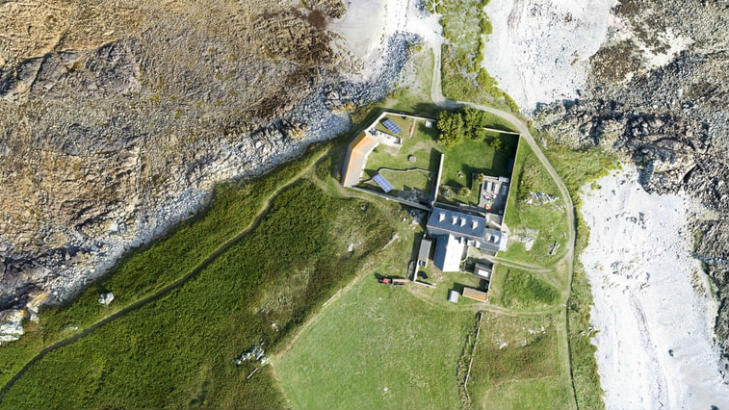
Drones are perfect for aerial viewing and inspection because of their ability to capture images and footage from above while being remotely controlled.
They can survey the most difficult areas, saving man hours and preventing endangering of personnel. Where inspections and surveys previously needed costly helicopters, drones are cutting costs by doing the job faster, more efficiently, and at less cost.
Using drones for surveying and inspection is one of the most sought after and most lucrative UAV-related business ideas you can get into today.
Aerial surveys have applications in several fields, including topography, digital mapping, archaeology, feature recognition, agriculture, security, mining, different GIS applications, and so on.
A lot of people need aerial surveys and you can capitalize on that by opening a private company that offers aerial survey services.
Inspection is also highly sought after by several businesses and companies like utility companies, mining companies, insurance companies, construction companies and agricultural companies.
Utility companies have been using airplanes and helicopters to inspect their electrical lines located in remote substations for years.
Not only is there a risk to personnel, this practice is costly too.
Today, they use drones for that job. Their high definition cameras and ability to access unreachable spaces make them ideal for inspection jobs.
You are going to need top notch skills in aerial photography and videography if you choose to go down this route, and also, the right sort of drone and accessories to do the job.
But there is no doubt about the high demand for the service.
Other Ways to Make Money with a Drone
The section above focused mainly on ways that you can go out and make money by using your drone. There are definitely other unique ways that we haven’t covered in detail, such as becoming a professional drone racer — things that seem a little farfetched.
Below, we’re going into detail about ways that you can make money in the drone space — not always by using your own drone, but by operating in the drone industry.
Drone-Related Business Ideas
Easier to Set Up
The drone money making ideas in this first part can be considered easy to set up because of their low barriers of entry. Virtually anyone can make up their mind to take up any of the following ideas and be ready in start doing business within one week to a month.
Selling Drones

Drone retail was always going to be at the top of our list for obvious reasons: somebody has got to supply the growing demand for drones that is sweeping across every continent on the planet.
There are several ways that you can make money selling drones too. You could sell them exclusively online and reduce some of the overhead involved in starting and running the business.
You could sell them offline and grow a rock solid reputation in your local area and beyond.
You could run a hybrid, featuring both online and offline retail — best of both worlds, in a sense.
And lastly, you could auction off your old drones which you no longer need.
Reselling drones — like anything else — will make you money. And drone retail works like any other business, requiring the same sort of strategies that apply to reselling other goods.
You can purchase popular new drones at one price from the manufacturers, and then later sell them to the public at a higher price in order to make a profit.
To increase your margins, don’t end only with drones themselves. Sell their accessories as well.
People in search of drones will, no doubt, need batteries, chargers, propellers, cameras, gimbals, extra LED lights, and a host of other products that go into making drones special.
This is what drone retail consists in at its core, and it will work whether you operate an online store or an offline store.
In addition to having your own drone store online, you can also sell your drone products through online marketplaces.
Many of these marketplaces exist. Some have massive online presence and appeal like Amazon and Ebay, while some are more specialized, niched down, and cater to a smaller but more dedicated audience like DJI TradeUp and others.
To get started, you first need to get in touch with a supplier or manufacturer who sells drones at affordable prices. Affordable here means anything that is below the going retail rate.
Most of them will have an active online presence, and you can reach out through their website or over social media.
As you can expect, there are costs and procedures involved in setting up your own retail business. Upfront costs and fees exist for maintaining a store, and these will vary with location.
The costs and regulations will also differ for both online retail and offline retail so you want to do the necessary research for your area. And then decide which works for you, given your present situation.
As already mentioned, there are many ways to sell drones and make a reliable source of income; you just need to find out the lowest hanging fruit as far as you are concerned.
Things could become even easier to implement if you already have a store for electric devices and gadgets like computers and others. In that case, you could simply add drones as an added offering, and this will cost less than setting up a specialized store.
There is a large enough demand for drones (that is projected to keep growing) to make drone retail one areas definitely worth looking into.
Drones for Hire
Drone rental or drone leasing is one drone business that might appear subtle but actually has bags of potential packed in.
At this point we know that the demand for drones is on the rise. But that does not mean that everyone is ready, willing, or even able to fork out hundreds or thousands of dollars for their own personal drone.
Some people are not hardcore enthusiasts or recreational flyers, and need drones just for a short-term specific purpose, for example — like a holiday trip, a few hours at the beach, or a film project.
These are one-time occurrences that people would rather not have to spend thousands or hundreds of dollars for.
So, just as we have car rentals, boat rentals, and even home rentals, we now have drone rentals.
And it’s a booming industry too!
There are a number of startups that enable drone owners make money by listing their drones for rent. Some of these style themselves as some sort of AirBnB for drones, handling payment, scheduling, messaging, and more.
Some platforms even offer deliveries of rented drones if customers would rather not meet the owners of the drones.
You can take advantage of this market as a drone rental business.
If you are someone who wants to get a slice of the drone industry but would rather not offer services yourself, then the rental space could be your best bet.
In addition to renting out drones to those who need them on a temporal basis, you can also sell new drones and used ones for those who do need them.
Sometimes people want to test out their drones before making a purchase and you can accommodate them by renting out their preferred model to them to test out for a limited time before making a choice to buy.
For an even higher margin, you can recruit reputable, registered pilots to rent out their services over your platform. Because, not everybody who wants a drone for a short while necessarily knows how to fly one.
Not only does this give you more income, it allows you keep a close eye on your merchandise.
Setting up a drone rental business could be engaging and profitable for the right person in the right location. It can be done both online and offline as well, making it an idea that is truly versatile.
It also allows you — and many other interested drone owners — the chance to extend the lifespans of beloved drones you are not yet ready to let go of.
Depending on where you are, you need to do your research to find out the rules pertaining to setting up a drone rental business and any other service you wish to offer through it.
Drone Repair
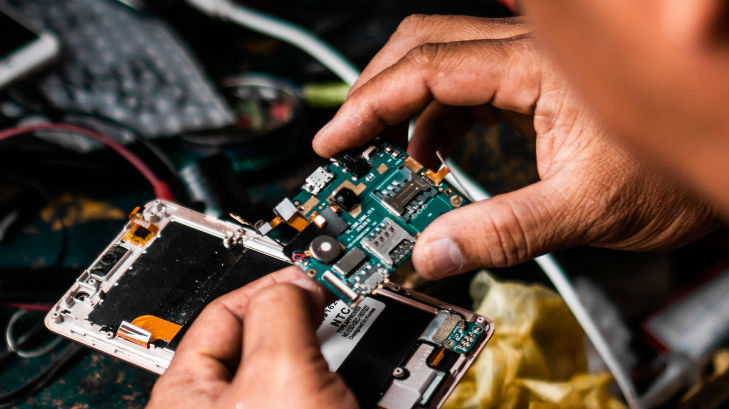
So we are not yet at the point where we have a drone repair shop on every street corner like we do with cars and other repairs.
And that is a good thing…for you, at least.
Drone owners who have to shop around for several hours or days for drone repair experts within their reach may not enjoy the situation. But that simply means more business for you going forward.
With the number of commercial drones constantly on the rise and currently in the millions, you can bet the number of crashed or damaged unmanned aerial vehicles to keep rising as well.
Drone repairs might not sound like the most exciting entry into our list, but it is certainly one of the most necessary and most sought after.
Expect this particular drone niche to explode as the industry moves forward.
And it is not hard to imagine why. Some drones that cost thousands of dollars to replace may cost as little as $150 to repair.
Drones are assembled with the highest quality in mind, but they are still fragile pieces of hardware. Opening a drone repairs shop, therefore, could lead to some pretty brisk business.
It is not uncommon to run across repair shops in large cities with a prominent sign saying: Temporarily not accepting new projects at this time due to high volume. Please check back soon.
This only emphasizes the opportunity presented by so few providers being available to meet a growing need.
There is even an opportunity to be had by catering to military drone repairs.
Colleges and higher education institutions like the Northland Community and Technical College have been teaching unmanned aerial vehicle maintenance for larger military type drones
And plans are underway to expand the program to include smaller or consumer drone repair. In addition to that, teachers are promising a high-paying job after just one or two years.
So how do you get started?
First you need the technical skills to provide the service. If you already run a mechanic shop of some sort, this might only require adding another department to your service station and then recruiting the right talent.
But you could still start from scratch if you have the right skills.
Drone owners basically have three options to choose from when their drones need tune-ups or repairs. They can send their device back to the manufacturer, turn to a repair expert, or fix it themselves.
You could take advantage of this playing field by offering the services required. Some repair shops specialize in high-grade large drones employed by the military, while others specialize in low end commercial grade drones which are specific to a few manufacturers.
Go with the option best suited for the talent at your disposal.
Some repair shops ramp up their prestige and value by partnering up with manufacturers to present themselves as authorized repair outlets.
And these partnership benefits all involved because drone manufacturers and operators get the quality services they desire and repairers fill a lucrative need.
Drone Programmer

One piece of that often gets ignored in the public’s understanding of drones is the software. The hardware we see and feel is already so occupies our collective consciousness so much to the extent that we forget the juice that makes it all run underneath.
When drones are manufactured, they are programmed to do a lot of things that can be considered extraordinary. But even so, there is no way that all possible functions are taken into account.
People will come up with ways to use their drones which will require additional software for execution.
And that’s where drone programming companies and startups come in.
You can put your programming skills and drone knowledge to good use by running a business that specializes in creating specific software demands for drone operators.
The possibilities are as limitless as the human imagination. But the sort of software drone operators require can be separated into two broad categories:
Software that uses the drone’s SDK and API, and software that doesn’t.
The kind of software that does not require your drone’s SDK or API is usually the sort of software that:
- Processes data collected by your drone after its flight
- Operates without any need for your drone’s real-time flight data—for example software that involves the drone business
Real life examples of this sort of software packages may be a solution that allows insurance companies to assign different drones to different claims cases for drone audit.
Another example would be a program that alerts drones within a network when they are not allowed to fly in an area that would otherwise be legal to fly within.
Conversely, software that does not use the drone’s SDK and API is usually the sort of software that:
- Involves real-time flight management (tracking your drone in real time and possibly updating the route at the same time)
- Exchanges data with your drone on the fly—like video and photo transmission
- Plans the flight
Examples of this sort of software in real life would include drone racing software. Software like this allows users to track the drone in real time during the competition, measure distance, and make adjustments as the situation requires. They also allow the constant transmission of information between the drone and the racer.
Another example would include mobile applications that allow multiple drones to gather information like images and survey data from several areas and relay to one single repository or database. Such software could also be able to gather this information and represent in graphical form like 3D maps and graphs for easy digestion and review. This sort of software is crucial in industries like disaster relief where critical decisions need to be made urgently.
Many drone manufacturers have understood the need to have drone whose software interfaces are customizable, so they readily provide SDK and APIs for custom software solutions.
Drone programmer businesses are only going to get busier as more industries take up drones as possible solutions to the problems they face. Each industry would come with its own challenges, and each business will need to be treated on an individual basis.
This presents a golden chance for a steady stream of income for programmers who can provide. And given the fact that we are dealing with software, there will be needs for regular updates as the business landscape evolves.
What this means for you as a drone programming software business is the chance of being kept on a retainer—the golden goose for any business and a guarantee that you will be in business for a long time.
And because this sort of business is software based, overhead costs are relatively lower than one would imagine.
Drone Manufacturing

This is another outlet that you could make lots of money from if you go about it the right way and also put your creativity to good use.
The reality is that the drone manufacturing space is not exactly new. Marilyn Monroe’s war job was in a drone factory doing assembly work. So, drone manufacturing has been around for more than a few decades.
What does this tell us?
First of all, it lets you know there is more than enough market equity or share to go around, and this has been sustaining the dozens of industries in this space for over 60 years.
The industry is just starting to speed up now, in fact. With the right technical knowledge, team, and focus, you can make a killing by starting a drone manufacturing company.
And you don’t need to be superman or Elon Musk either. Many of the drone companies today which are making great strides started as a group of people who simply wanted to try new things and push boundaries with the hobby they loved.
The second thing to take note of is that in order to be successful as a drone manufacturer, you need to go beyond the obvious to bring something new to the space.
Get this: there are well over a hundred different drone manufacturers available in the market today. Some of these have been in business for decades.
Any manufacturers getting into the space now would be considered late entry, and would have a harder time catching up and making a splash in the pond.
Your best bet would be to try and bring something special to the space. Not only will that get you noticed as you come to the forefront, it would get your new manufacturing company a dedicated following pretty quickly.
If you were looking at this option, you better have your technical knowledge and your knowledge of drones up to par.
If you don’t, you want to brush up on those before proceeding (or gather around yourself a team that has said knowledge and make them believe in you).
As with any manufacturing endeavor, there is a confluence of knowledge and skill which you need to make it work. In the case of drone manufacture, you need:
- Remote control operations (avionics, software, navigation, piloting, cameras, data transmission, fuel or battery consumption, controller design—and this could take advantage of smartphone tech or game controllers)
- Flight specifics (Airframe and wing design, propellers or rotor design and operation, aircraft body materials, landing gear, aircraft motor selection or manufacture)
Some manufacturers choose to outsource some of these activities to companies that have competencies which they lack.
But it would be an oversimplification to think you can assume your entire process. Successful businesses are not built that way. So you really should look into developing an internal team and an external supply chain from the onset.
The sort of production facility your new drone manufacturing company would need depends on the activities you intend doing.
Some manufacturers specialize on creating drone parts, for example. And this is less heavy duty than producing whole drones.
Some manufacturers only produce a part of the manufacturing process in-house, and then contract out the rest.
Some manufacturing activities may simply require enough 3-D printers to keep up with demand.
What your manufacturing company does will determine the equipment you need to get running, the talent you need to acquire, and ultimately the cost of getting started and running the show.
Pilot Instructor
Almost everywhere you go, commercial drone operators are required to get a pilot’s license before they can operate their drones. And this requirement falls on all those whom they employ in their business as well.
Have you ever thought who trains and certifies these pilots all over the world?
People assume the government agencies in charge do that job since they are the ones who impose the rules. But the truth is that only a small fraction of the trainings are done by these agencies worldwide.
The government agencies like the FAA provide the certifications and the exams, but it’s drone entrepreneurs that provide the training in “pilot school”.
If you consider yourself a master at flying drones of all types, you can cash in on your talent by providing training to aspiring drone pilots.
And because licenses have to be renewed regularly (In the USA, after 24 months), you can be sure of recurring business once you set up shop.
Now, you can set up shop both online and offline. This covers all the bases for people looking for drone pilot training.
You can provide study materials online that breaks down the complex rules and requirements of the aviation authorities. And then provide 1:1 coaching for people in need of a real life instructor for flight experience.
You can also scale up your business by creating and selling drone pilot lessons over popular education websites like Udemy.
The advantage of this approach is that it allows you to go much deeper than certification training, and there are no added costs after you have created the course and uploaded unto the platform.
Providing tuition to more people comes at no extra production costs or time costs to you because the platform hosts and handles everything, including payment.
As for drilling down deeper into content, many course providers go beyond flight training to provide instructions on things drone owners care about like:
- Camera setup; giving a detailed walkthrough on different video options, including the best resolution to use for shooting, editing infrastructure, the best field of view for better perspective while filming, as well as the preferred frame rate to go with different lighting options
- Aerial cinematography, including the correct camera positioning techniques for unique drone shots, as well as basic safe practices when filming from the air
- Video and photo editing techniques to ensure pilots end up with a professional product after post-production.
There is really no reason to limit yourself to flight lessons when you can do more to fill existing needs.
Drone Teacher: Courses

Many drone entrepreneurs start out as drone pilot instructors, and then branch out to provide specialized classes on drone functions like drone photography and videography.
You can skip all the timidity and start out as a teacher of drone photography and videography from the get-go.
So, similar to becoming a piloting instructor, you could instead teach people that already know how to fly a drone to take their own photos or videos from the sky — or improve their current ability if they already know how.
Drone photography and videography are one of the most sought after skills in the world today, and you can take advantage of this fact by sharing your knowledge for a fee.
Now, you can set up shop online or offline. Some people, literally need someone to hold them by the hand and would pay extra for one-on-one coaching.
But, in order to really scale up you need to ramp up your efforts online.
There are only so many people in your local vicinity who are interested in learning how to shoot better shots from the air with their Mavics. But that number climbs significantly when you go online.
Consider setting up your education portals through your own website where you have total control over pricing and other features that are important to your business.
On your own website, you call the shots and can really allow your personality and brand shine through without fear of getting a strike from anybody.
At the same time you want to take advantage of education marketplaces like Udemy, Coursera, and others to reach a large number of people.
The disadvantages of these platforms include having to abide strictly by their rules and not being able to let your brand shine through as much as you want.
However, they do allow you to leverage the millions of people who visit their sites on a daily basis.
Plus, if you are savvy about things, you could still find a way to funnel students to your own website and social media pages after they sign up.
Some of the material which you may choose to cover as a drone photography and videography instructor includes:
- How to choose a drone based on your skill level and your need. Most newbies have no idea how many drone models are actually available out there, talk less of knowing which to use to achieve their goals.
There are basically two types of drones that they will need to get acquainted with very quickly: those with in-built cameras and those that allow you to attach your own.
Some students who already have a hang of their own cameras may be better off with the second type, needing only to learn how to fly.
- Detailed instruction manuals on how best to use various drone types for photography and videography. These manuals have to answer the questions the students did not even knew they had. That way they spend more time trying new shots rather than tinkering with their drones.
- Rules and regulations in place concerning drone photography and videography. This is important for you and your students so neither of you get into trouble with the law.
- Safe flying while carrying out drone photography and videography.
- Post-production, including editing and sharing photos and videos.
And so on and so forth. Basically, your aim as a teacher of drone photography and videography would be to become a reliable resource for anyone who wanted to get up to speed quickly and reliably.
Freelance Drone Pilot
Becoming a freelance anything is a great way to put your skills to profitable use.
If you love flying drones, and would rather work for yourself than deal with answering to a boss, and want to use your skills for a variety of different purposes, then start a freelance drone pilot business.
A freelance drone pilot business is also ideal if you would love to make a full-time income without having to work with other people by starting a large business.
How much do freelance drone pilots make?
Like with every business, there are those who don’t make any money.
And there are those who make it to six figures in dollars through diligent networking, hard work, and persistence.
To become a freelance drone pilot is pretty easy too and requires just a few steps. Along with following legal rules like getting certification and licenses, you’ll need to:
- Get the required hardware. This goes without saying, to become a freelance drone pilot, you need adequate access to a drone to fly and related equipment like a good camera and important software.
- Get insurance for your drone. No arguments on this. Accidents happen and you want to make sure you are covered when they do. You also want hull coverage to take care of any damage to your equipment while in use. Many worthwhile clients will only work with you if they see some insurance, anyway, so get some at the beginning.
- Register your business. As a freelance pilot you can register as a sole proprietorship. Or you can register as a limited liability company (LLC). A sole proprietorship is easy to set up and comes with some tax deductions in some areas. But if you intend expanding one day and taking on some employees, you are better off registering as an LLC.
- Identify your services. This is where you decide what you want to get paid to do with your drone. The more services you can provide the better. Some services cater to lucrative industries, while some are not so hot. Other services—like thermography—require certifications, while others do not and can be started upon immediately.
- Create a website and build your portfolio. Once you check all the boxes for starting a drone freelance business, you want to make it very easy for your potential customers to reach you and see your work. One of the best ways of going about this is by starting a website and being active on social media.
- Network and do outreach. There are several ways to get the word out about your freelance drone pilot business: social media, listings, cold calling, cold emailing, conventional advertising, social media, and more.
In addition to marketing your freelance services on your own, you could also list yourself under dedicated websites that cater to people in need of pilot services.
This is actually a great way to start while you are getting a feel of the industry.
Becoming a freelance drone pilot is one of the most lucrative drone business ideas around. Drones are being integrated into an increasing number of industries; and somebody has got to fly them.
Flying Ads
Advertising with drones is one of those business ideas that sits squarely at a junction that leads off to so many industries.
A drone is the perfect tool for advertising and has been used in advertising residential real estate, resorts, beaches, hotels, and more.
This is one of the hottest drone business ideas available now and one which will leave you open to serve clients from a wide variety of industries and industry niches once you set up.
If you are an entrepreneurial drone videographer or photographer who prefers to be hands on with their knowledge you cannot go wrong with branching off into advertising.
You can use drones to offer your clients innovative campaign options. And there are enough options provided by drone footage to ensure that there is never a dull day at the office for you.
Drone advertising services could include both indoor and outdoor aerial advertising options. You could also include drone-based banner advertising or so called low altitude “flying ads”.
Drone advertising agencies also carry out promo drops, where drones drop product samples into client’s hands.
There are so many options that drones make possible and which you can offer to your clients.
Drone Advertising and Marketing Business

According to Harvard Business Review, many businesses are turning to drones to ramp up their digitalization strategies.
When backed by cloud services and big data techniques, the data gathering capabilities of drones are significant enough to potentially alter the information landscape in significant ways.
This presents a drone business opportunity for operators who have drones equipped with data-gathering sensors like cameras and other things.
Apart from this, drones can be integrated into marketing campaigns by using them to carry advertising banners, shoot aerial footage, and maximize exposure for the companies.
Given how competitive business can get, your clients will appreciate the fresh perspective which drones have to offer. Not only are drones an eye-opener, they can earn a business a significant amount of attention — something which businesses are willing to fork out a lot of money for.
Slick and professional looking aerial videos and photos captured by drones may sell private estates faster than otherwise, and also bump up the selling price, for example.
Some real estate companies even go as far as creating an immersive experience using drone video footage for potential customers who cannot be physically present on the property.
Resorts and hotels are also getting on the bandwagon, choosing to advertise their facilities from the air using drones. People are more likely to commit to a hotel if they are given a view of the entire property, rather than just the best parts in a brochure.
Apart from the fact that aerial shots are forever cool, people appreciate the honesty.
Race Course Venue
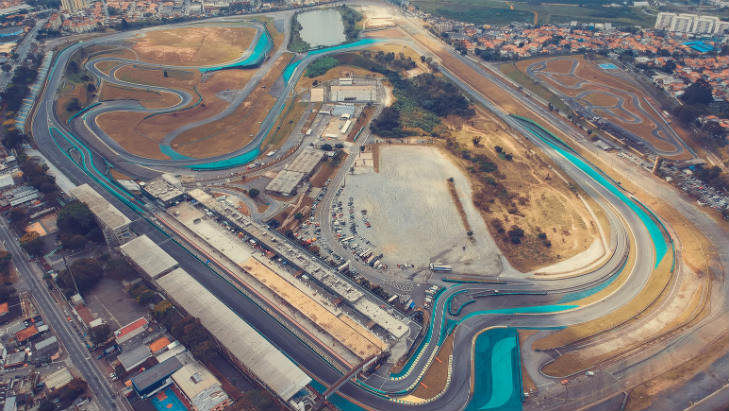
As soon as consumer drones took off, it was only a matter of time before enthusiasts would start thinking about racing to decide whose device was the fastest.
Today, drone racing is an international sport drawing significant attention and funding from all quarters around the world.
The most prestigious and well-funded event in the space today is the World Drone Prix in Dubai which has a total prize fund of $1 million.
As you can imagine, a lot of players come together to make this work. From the manufacturers (racing drones differ significantly from your regular run of the mill consumer drone), to the repairers, to the racers, event organizers, and also hosts.
Like any other racing sport or competitive sport, drone racing needs favorable venues to host their events, and if you happen to have such a venue available you can make a lot of money as a host.
This idea is not exactly revolutionary by any means. We’ve seen it with golf resorts all over the world. So why not drone racing resorts?
People are already cashing in on what will eventually be a billion dollar industry.
The US National Drone Racing Championship took place at the 2015 California State Fair. It was a 2-day event with a cash reward of $25,000 that drew 120 competitors.
This was the first drone racing event of this nature to take place in the US. But similar had already convened in countries like France, Australia, and the UK.
In 2016, the annual MultiGP Championship was held at the Academy of Model Aeronautics’ headquarters in Muncie, Indiana. Over 12o pilots competed after qualifying through the MultiGP Regional Series which consists of qualifying events and regional finals in 15 regions across the United States.
Clearly, as interest grows, so too will the need for more suitable and more prestigious venues.
If you choose to monetize your property in this manner, you would do well to educate yourself on the various guidelines established by the different drone racing organizations concerning their racecourses.
- MultiGP: The largest drone racing league in the world, headquartered in the USA. This is a global, professional league with over 1000 chapters worldwide including locations such as Australia, South Africa, Europe, and Asia. They have the highest number of registered pilots in their community.
They have codified what they expect as far as racing venues for their chapters are concerned, including opening gates, hurdles, obstacles, and finish lines.
They also use a Universal Time Trial Track program to rank their pilots worldwide on standard measured courses.
- The British Drone Racing League (BDRL): This drone racing league as already operated a number of professional drone racing events in the UK and looks set to keep doing so for the foreseeable future. Their events and the nature of their racecourses are organized and planned in compliance with the Civil Aviation Authority (CAA).
- The Drone Racing League: This for profit drone racing organization emphasizes creativity with its courses. They require complex, three-dimensional racecourses in international locations and which stretch about a mile-long.
- DR1 Racing: This is another for-profit racing league that emphasizes outdoor racing in iconic locations around the world. They prefer each of their racecourses to use a mixture of environmental and manmade elements for a truly unique experience.
Some other drone racing organizations (like the US National Drone Racing Championship) prefer to keep things simple and will conduct their races in open areas with less catastrophic obstacles. They keep things traditional with flags and cones instead of walls and tunnels.
Each of these organizations would love to partner with people willing to create a memorable drone racing venue for their competitors.
You can take advantage of that to provide a nice income stream for yourself, especially as there are lots of these events planned every year. There are certainly enough to keep your venue booked regularly.
Drone Website
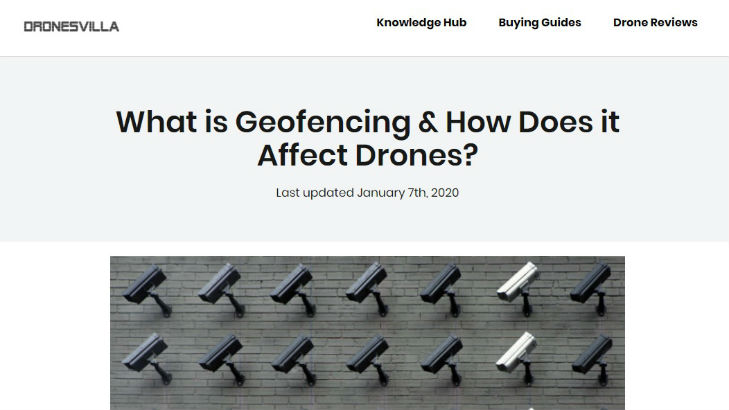
In this day and age, you can make a lot of money and gain a lot of prestige by becoming an authority on any topic.
And usually, this starts with a website.
One of the most lucrative drone business ideas with the lowest barriers of entry is starting your very own drone website.
If you run a drone related business, having a website is an absolute must. People are likely to do their research on your business online before they commit to doing any transactions with you.
It does not matter what your business is; you need a website.
However, websites are not beneficial only to those with drone-related businesses. You can create a website for various profitable reasons including:
- Reviews: On your website you can talk about the latest or most in demand drone models, honestly reviewing them for the benefit of your audience. The best thing about reviews is that you can be totally honest and still make a profit—even if the reviews are negative. The more honest you are, the more your audience will appreciate.
- News: You can provide information on the latest and greatest happening in the drone space, and this will surely make you an authority in the eyes of whoever is reading. The drone space is constantly evolving. New models and technologies are being developed, new ventures are being explored, expos are being organized, and budgets, studies, and estimates are being published. You can expect to be busy if you run a drone news website.
- Affiliates: Many businesses rely entirely on affiliate websites for their revenue. And the main reason for this is that it is a very strong and reliable business model even today. In certain areas it is mandatory to disclose when you receive a commission for every purchase made on your site. But this has zero impact on how effective this means of revenue is. In fact, some of the biggest, most reputable websites in the world count affiliate marketing as one of their major sources of revenue.
- Guides: In a rapidly evolving space like the drone space, people will always be in need of guidance on a lot of topics. For example, you could create guides the different drone regulations that obtain in different areas. You could create how-to guides that give advice on what drone operators consider hot-button issues like flying at night or travelling with your drone through an airport. You could provide reports on the state of the industry and how you project things to be in the future. It’s all left to your creativity and what you perceive matters most to your audience. Some of these guides you can give away for free, while others you can offer for a price. More revenue for you.
- Merchandise: There are of drone related merchandise — including drones themselves which you can sell through a dedicated website. These include photos and videos of iconic spots which you have captured with your drone camera. If you are creative enough, you can even make a killing by creating and selling clothing and other items branded with drone related images.
The sky is your limit as far as making money through a dedicated drone website is concerned.
One advantage that comes with this business idea is that it doesn’t cost as much as others to set up. Apart from expenses related to registering your business, you need only a few hundred dollars to set up a professional drone website at most.
It’s virtually free (barring hosting expenses) if you have the technical skill to set everything up yourself.
Expect to put in the work at the beginning as you build your website’s audience and grow your authority in the space. But once the initial birth pangs are gone you can reap the benefits of having your own website working hard for you 24/7.
Niche Social Media Influencer

Just like with websites, you can make a lot of money by talking about drones.
There are no limits on what you can talk about.
People even make money discrediting drones over YouTube and Instagram.
You can do the opposite. After all, the chances are high that if you are reading this guide you love drones.
Youtube, Instagram, Twitter, Facebook, and other social media sites can be a great way to make money from your hobby.
You can review different drone models over these sites.
You can review drone events.
You can offer insights and opinions about big industry news.
You could vouch for different products to your audience in exchange for a fee from the manufacturers.
You could cultivate and grow active communities around the subject of drones to which you market to forever if you want.
You could do these activities and more over multiple social media channels to increase your reach and, by default, your chances of making money.
Just like with websites, after setting up your social media review pages, you will have to spend the early periods growing your audience and building your credibility and authority.
But in some ways, setting up a review site is easier than setting up a website. And this is why:
Social media platforms are effectively a bunch of people clustered around topics and shared interests.
You could start reaching your target audience within seconds of using the right hashtag, for example.
Communities abound over social media and you could easily become a respected authority simply by being helpful and sharing your knowledge in the comment section.
Plus, there are no set up costs when it comes to opening your own page. Social media pages are free to set up and populate. It costs you $0 to open an Instagram or a YouTube channel.
That’s not the case with websites — these come at a cost to set up and maintain, and also require more time to reach the target audience.
However, it is not advisable to build an entire business on a platform you do not own. The content you create on these social media sites could easily be pulled down should the platform moderators wish to do so.
And they don’t need your consent to do so.
A more secure strategy would involve investing in social media channels as well as websites. That way, you can funnel all that easy-to-get attention to your website — which is truly your own piece of digital real estate.
Plus, using both gives you more options for making revenue. You can’t complain about that.
Drone Farming
Drones are gaining a reputation as an integral part of farming and agriculture. If the farm you pass by every morning is not yet using a drone, rest assured that they will soon.
There is a significant need to fill as an entrepreneur offering agricultural drone services.
The average farm size in the developed world extends to hundreds of hectares, implying significant costs in cultivation and maintenance throughout the farming cycle.
Drones have the capacity to cut costs and time required in this process, while increasing overall efficiency.
Case studies and real life applications have shown that integrating drones into agricultural processes can lead to higher yield and higher overall revenue.
A fact which you can highlight when you are trying to convince farmer clients on the necessity of your services as a agricultural drone expert or service.
The applications of drones in agriculture are many:
Drones can produce precision images of crops that can help determine where stress areas are and where growth levels are on schedules. This is because of their multi-spectral imaging cameras are capable of capturing visible light and near-infrared light reflected by crops.
Farmers can then use this data to make smart, data-driven decisions that would otherwise have eluded them. Decisions like how to integrate smart irrigation systems and how to allocate pesticide can all be decided very quickly with the data gathered by drones
In addition to helping with water and disease management services, drones can also assist with better planting and crop rotation, especially as they offer a higher degree of all-round knowledge about how the crops are progressing.
They can also help with problem detection, targeted scouting, and crop monitoring including health, count, size, and canopy area.
Drones can also significantly increase accuracy and reduce loss when used for planting, fertilization, and irrigation. Their accuracy can be set to within a few centimeters, making sure that very little is lost in the process.
So how does one go about setting up an agricultural drone business?
Decide What Agricultural Drone Service You Wish to Offer
Drones can do a lot to make life easy for your agricultural clients. Not all of these may be within your reach at the beginning, so do your homework and decide which will give you the highest ROI.
To be clear, drones can help with automating planting, counting plants and livestock, identifying pests and predators, help acquire data, aid in irrigation and fertilization, and so on. Find out which you can get started with and run with that.
Hire the Right People for the Job
In the beginning, you might be tempted to think of only the positions which you need to be filled at that moment—especially if you are a sole proprietorship. But if you have any intentions of growing in the future and bringing more people on, you would do well to think of the roles those people will occupy in your setup. Some key positions which agricultural drone services require include: UAV Operations Coordinators. Drone Data Analysts, Pilots (In-house or contracted). Educate yourself on the roles that would be crucial in the beginning and later on, and then make allowances.
Get Insurance First
Insurance is something which you get while hoping you will never need. As a business manager, it is your job to minimize risk as much as possible. Some locations make it mandatory to get insurance as a commercial drone operator. But you should get it anyway whether you are required to by law or not. You should consider getting hull insurance to cover your equipment if you use expensive gear. Chalk it up to the price of starting the business.
Acquire the Right Hardware and Software
This is related to the first step. Ultimately, you want to get the equipment and software you need to fill the role you envision for your business.
There are many sensors and software packages created for the drone agricultural space. Some of them will not be of any interest to you at the beginning.
So, do your research so you don’t go overboard when getting the hardware and software you need.
Market Your New Business
After registering your business and getting all the equipment you need to execute, you will have to market your services and get buy in from farm managers. Lead with metrics and show—rather than tell—how drones can really push the needle with their technology. Emphasize on what matters most to your farmer clients: more yields, less cost.
Harder to Set Up
The drone ideas from this point are what could be considered difficult to implement for various reasons ranging from the amount of startup capital to regulatory barriers and the need for proprietary tech.
To say some of the ideas here are financially promising would be an understatement. Many have the potential to change the way we live, shop, and travel.
But they may take years to roll out on a mass scale due to the massive amounts of capital needed to implement, regulatory barriers that need to be overcome, and tech that needs to be developed and tested for safety.
No doubt, in the future, a lot of these ideas would be common place enough to be considered easy to set up. But that time remains some ways away.
So here goes:
Drone Insurance
Drone insurance is one of the most reliable drone business ideas you can get into. The more the drone market continues to grow, the more this idea makes sense.
Drones are cheaper than they have ever been, but the majority of commercial models will still put you more than a few hundred dollars out of pocket.
Professional drones cost a few thousand dollars, and that is not even considering additional accessories and software packages that are added on later.
This explains why a lot of people are waking up to the need for reliable insurance to protect their gear and investments. It is just common sense.
And they are looking for quick, reliable, and efficient providers they can count on to have their backs and meet their needs.
And this need is heightened for commercial drone operators.
In some areas, it is not mandatory for commercial operators to get insurance before operating while in others it is.
But many clients will only work with commercial drone operators who can show proof of insurance.
Reputable companies simply do not want the risk if they can avoid it.
In some instances, commercial drone operators might need a minimum level of insurance in order to even qualify for certain projects, whether it is needing to secure a city film permit or working with a client that requires insurance for each of its vendors.
So there is growing market for drone insurance providers to take advantage of.
As with any financial institution, there are regulatory and capital requirements to get started, and these vary from one location to another.
Get educated on these requirements before embarking on starting a drone insurance company.
The drone industry is flexible and varied enough to allow you a host of options for your offerings.
You could offer bespoke protection for commercial and recreational unmanned aerial vehicles of all sizes. And this could include full cover while they are in flight, aviation liability, data protection, and invasion of privacy.
You could offer coverage per flight, per month, and annually, or all three if your business plan demands it. There is a large market for all these options, and many insurance companies and startups are already taking advantage of the market.
Drone Security & Surveillance
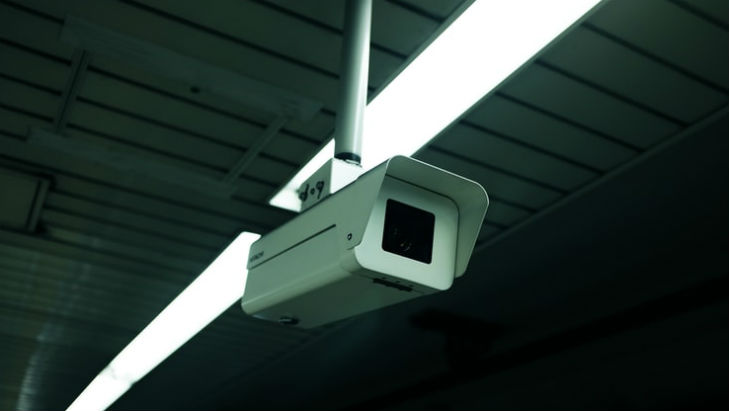
Many experts believe that the security market is primed and ready for drone automation and scaling. The cost, time, and safety advantages that come with autonomous fleets can push significant value for any business willing to invest in drone security.
Not only will drone patrols augment human guards, they will also increase the capabilities of security agencies, risk managers, security directors, and other stakeholders.
Drones can help in enabling faster, better decisions. They can help with real-time incident response, event management, disaster response, and remote security operations, among others.
This is a reality many corporations and businesses are waking up to, and you could be perfectly poised to fill a growing need if you can set up your own drone surveillance and security business.
Some of the technological drivers making this the best time to invest in a drone security business include:
- The availability of reliable, off-the-shelf hardware
- The development of cloud-based and hardware agnostic software
- Faster ROI, driven by relatively low capital expenditure and seamless integration
As a drone security and surveillance company there is a host of ways you can choose to deploy your drones for a fee:
- Mapping Venues Pre-Event to Create an Action Plan for Security Deployment. Security drones could be used to map out a venue and relay information to the team in charge. This information could be used to decide on the best way to deploy security personnel and familiarize them with the location’s layout.
- Mixing Tethered Drones and Mobile Drones To Aid In Security Response. By placing tethered drones to provide consistent flow of information about key areas, security companies can promise a bird’s eye view of a location. Deployable drones can then be added to that setup to investigate potential disturbances and reduce response time.
- Using Drones to Deter Intruders. Using drones to watch all angles of a location or event can act as a deterrent to intruders. Drones are far more reliable and flexible than CCTV cameras in this regard.
- Rapid Inspection. Drones can save time and cut the costs of man-hours by running a perimeter route faster than a human security guard. They are also able to spot and report irregularities faster.
- Intruder Response. Security drones come with a host of sensors and reporting software that make them very efficient at spotting and tracking intruders until they are apprehended.
- Stealth Surveillance. Security teams can employ drones to get close to intruders without alerting them. This is particularly helpful for night missions when headlights and flashlights may make stealth impossible.
- Drones Can Minimize Risk to Security Personnel. Deploying drones can open up blind spots making it less likely that security teams on the ground will be caught by surprise.
- Thermal Imaging. Tracking and inspecting rises to a whole new level when security drones that are equipped with thermal imaging cameras are deployed. These security drones are able to track intruders even through dense undergrowth and other obstructions.
- Reduce Response Time. Security and surveillance drones reduce the response time. Corporations and businesses can deploy them around a perimeter or a high roof in minutes and then quickly respond after it relays information back to the control center.
These are just a few ways in which drone security & surveillance companies are making a splash in the industry and changing the way things are done.
Depending on the jobs and projects you choose to take on, you may need to deploy only one drone or several. The cost of starting the business and running it, thus, varies. Choose the options that fit your budget and then go for it.
Search and Rescue
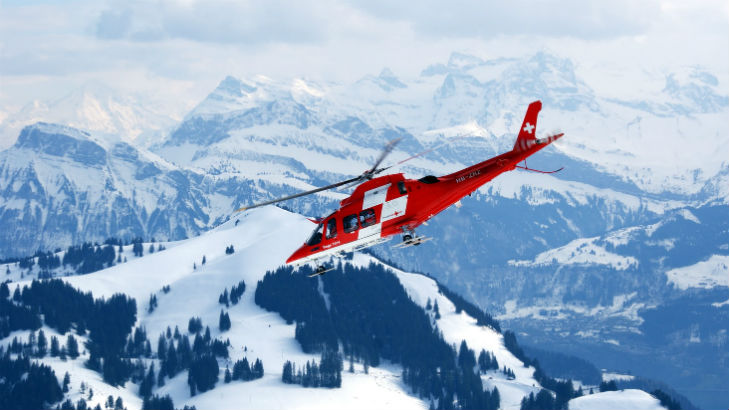
With their small frames and aerodynamic designs that allow them access hard-to-reach areas, drones are perfect for search and rescue endeavors.
By equipping drones with infra-red and night vision sensors, search and rescue teams can detect missing individuals using their heat emissions when visibility is poor. Drones can also supply emergency supplies when needed, saving valuable minutes in the process.
Traditional methods of search and rescue that make use of helicopters and dogs are not nearly as effective at finding people lost in a disaster situation like drones can. They are also more costly than drones.
What this means for drone entrepreneurs is that a nice opportunity has opened up to make money and feel good about doing some good in the world.
Drones are able to spot missing people and objects from the air more efficiently than a human looking down from a helicopter would. So an increasing number of drone operators are being called upon to ramp up search and rescue efforts.
There are freelance UAV pilots that specialize in this niche and get well paid for it.
The drones they use are usually smart and loaded with relevant software for identifying objects, gathering information, and relaying that information back to public safety officials in real time.
A lot of business comes rolling in during storm season when floods, hurricanes, earthquakes, and other unfortunate events come rolling in.
As a human being it is only natural to want to do your part in alleviating the suffering of others. And as an entrepreneur you should be only too glad to put your drone at the service of safety officials who have realized the potential which drones have.
Search and rescue drones have been used in populated urban areas and also remote areas that are hard to reach. Thus, no matter where disaster strikes, you can be sure your services will be needed.
Drone Delivery
What is one way to change the world from the sky? Drone deliveries.
A lot of companies and businesses are waking up to the potential of drones to act as an innovative means of delivery, and if you can cash in on this trend by offering your services to interested organizations and companies.
Many companies and startups are making huge efforts to redesign the entire deliver chain in order to increase the reliability and efficiency of drone deliveries.
And these include some heavy hitters like Amazon, UPS, Uber, and Domino’s Pizza.
Medical startups, charity organizations, and national institutions have also begun using drones to deliver various supplies in hard-to-reach areas.
Some locations are simply too risky or impossible for ground vehicles, and so drones are being called into play.
Now, because of the logistics and regulations involved, this is one business that is yet to kick off in a large scale.
Technological barriers and safety concerns remain a problem. For example, drones are not exactly heavy lifters. And also, in the case of urban delivery, how do you ensure that nobody gets hurt when they happen to be in the way of a delivery drone?
You want to keep these situations in mind should you choose to go for starting a drone delivery company. A lot of capital might be involved, as well as a lot of investment into proprietary technology to perfect your process.
But make no mistake, if there is one drone business idea that has the potential to alter the way we live, drone deliveries is it.
You should also be encouraged by startups that are making inroads in this area. This is a space that is not reserved only for the big boys.
The startup, Flirtey is delivering medical supplies in urban areas and pizzas in partnership with Domino’s in New Zealand.
Zipline is delivering drugs in remote parts of Africa by drone, while Flytrex, and Isreali drone startup is doing same with their partners in Europe.
With a little creativity, knowledge of the market, and determination, you could carve a niche for yourself in the burgeoning drone delivery space.
Augmented Reality Game Development

One of the best things about drones, and one of the main reasons why they are being integrated into many different industries, is their ability to seamlessly integrate with other technologies to produce new capabilities.
One of these technologies businesses are integrating with drones is augmented reality (AR).
When combined with AR, drones can be equipped with an advanced range of capabilities that open up new opportunities for recreation, business, and even government.
And many businesses are not missing the chance to cash in on this reality. If you have the right coding and technical skillset, you can create a business whose main offering is to extend the capabilities of their customer’s drones.
Some of the ways drones and AR are making an impact include:
- Games: One of the most obvious application of AR drones is gaming. And some businesses have begun taking advantage of this idea.
For example, there is Mission Drone from Air Hogs Connect. This game and its linked app allow pilots to operate a physical UAV through virtual AR missions.
The missions are usually rescue missions in a virtual city.
Another business taking advantage of AR drone gaming is Edgybees. They have created the AR mobile app called DronePrix AR.
Built with DJI’s software development kit (SDK), DronePrix AS works on DJI’s aerial platforms and allows users to master their piloting skills in a fun, safe, and immersive way.
DronePrix AR challenges players by requiring them to fly their drone through a virtual obstacle course, collecting prizes along the way. Players can compete for the best performance, points, and time in order to get on the worldwide leaderboard.
- Law Enforcement: AR drones can help law enforcement training. Drones are already been used in many areas of law enforcement like surveillance, crowd monitoring, patrol, and suspect apprehension. But with AR, they could also help in training by providing simulations for active shooter situations and hostage rescue.
- Disaster Response: Drones have already found a home in disaster response and rescue. When combined with AR, however, they can do much more like providing disaster maps and damage assessment after disasters are passed.
- Engineering: Engineers are combining drones with AR to make several engineering tasks easier and improve results. For example, surveyors use AR drones to superimpose valuable geographic data over the images they capture with drones.
Construction engineers are able to use AR drones to create 3D models of a project before any work even begins.
- Firefighting: Drones have also been used in fighting fires before. But AR drones take things up a notch. For example, using infrared cameras, they can create maps of hotspots that need urgent attention. These heat maps can also show where it is safe for firefighters to enter a building.
There is a huge market for AR software that augments the capabilities of drones. Anybody going with this business idea will be sure to create a nice income stream so long as drones keep being deployed to solve problems.
Drone Shows and Performances

Drones have gone beyond providing photos and films to being used as props for entertainment.
Drone displays use multiple drones, flying in a coordinated manner to entertain the public.
These drones are usually equipped with LEDs and displays are held at night for added effect.
The drones may be coordinated to produce images, and can even be used for advertisement purposes in this manner.
One of the major players in this space is Disney. They already have a number of drone patents focused on drone performance. They have also convened a number of live shows featuring floating projection screens, drone puppeteers, and light shows.
Another business investing into drone shows is Intel, who have produced a drone called Shooting Star which is specifically meant for light shows. These have been used during Super Bowl breaks and American Independence Day celebrations.
So what about you?
Celebrations occur every day all over the world. Can you see yourself supplying the entertainment the public so badly craves?
Traditionally, people and communities have gone with fireworks. But one obvious advantage of that drones have over fireworks is that they can be reused over and over again.
They also produce no air and noise pollution.
With the right amount of capital to get a significant number of light performance drones, your business can become a go-to name whenever a big celebration comes up.
Drone Taxis
Passenger drones or air taxis are another name that is used to describe drone taxis. And they are one area of the drone space that seeks to alter the way we travel forever.
Up till now, the drones you have been used to are those that are small in size and capable of lifting a few pounds at the most.
But there are efforts being made to develop unmanned aerial vehicles capable of carrying human beings and cargo autonomously from one destination to another.
As you can imagine, there is a lot more to this task than meets the eye. Getting an autonomous taxi up and running requires more than making a large scale version of the commercial drones you are used to.
If nothing else, the drone will exceed the maximum 55 lb. legal limit for civilian drones — a restriction that holds pretty much everywhere. And this is just one regulatory barrier that drone taxi entrepreneurs have to consider and deal with.
A drone that has the size to carry humans and luggage becomes, for all intents and purposes, a regular aircraft.
The level of tech involved changes at this point to include different sort of sensors on board, different level of radio equipment, and also — until the idea for autonomous air taxis arrived — a trained pilot sitting in the cockpit.
But several companies are pushing the envelope, making efforts to make drone taxis a reality. We are a long way from mass deployment, for sure, but a working prototypes have been built.
We may soon have a whole new way to leave our houses and head to work, skipping all that morning traffic, thanks to companies like Uber, Ehang, Airbus, Boeing, Intel Volocopter, and a few others.
This is another drone business idea with the capacity to change our daily reality forever. Competition is fierce and some of the heaviest hitters in the world are backing players involved.
Where does that leave you as a drone entrepreneur?
In a very good spot, actually.
Competition should not scare you, rather it should encourage you. There is money and history to be made in this space. That’s why so many people are interested and pumping money into it.
If you could gather the right team, develop the right tech, and attract the right amount of capital, you could find a home in this competitive space.
Don’t forget: a lot of the players currently trying to build drone taxi businesses are startups. And that is basically what you will be should you choose to start — you’d need to be a startup that raises several million in funding just to even start planning this.
We may receive compensation on qualifying purchases via our links. This does not change how we review items. For more information, please read our affiliate disclosure.



“If you accept anything — no matter how small — in exchange for your drone or drone services then you are a commercial operator and you need to get registered to stay legal.”
That is *not* true in the United States! The FAA does not care whether any compensation is exchanged. The rule is that any flight for which compensation *could* be charged, must fly under commercial rules. For example, I can fly photogrammetry missions for my own practice under recreational rules, so long as I do not share the resulting data with anyone who could make any practical use of it. As soon as I offer that data to anyone who could use it, whether or not I am paid in cash or barter, that flight must be flown under Part 107 rules.
Thanks for the update Alwaiz. We’ll research this and update asap.